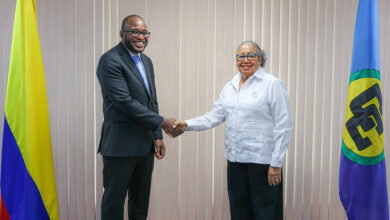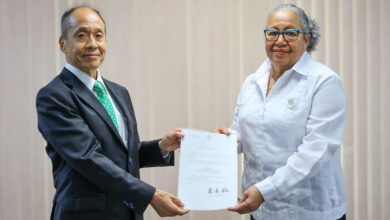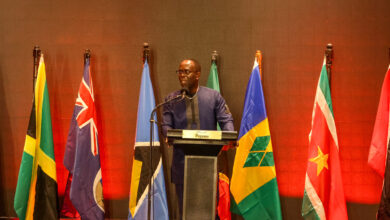Mr. Chairman,
Mr. Assistant Secretary General,
Distinguished Colleagues,
Delegates,
The Caribbean Community (CARICOM) has been closely monitoring the political and electoral events in Haiti leading up to and following the elections on 21 May and 9 July 2000.
Haiti is an incoming Member of the Caribbean Community – a Community that attaches great importance to the principles of democracy and good governance. These principles are enshrined in the Community’s Charter of Civil Society and provide the foundation upon which the Community continues to enhance its long-standing democratic traditions. It was therefore with much hope that CARICOM looked forward to the successful conduct of the legislative, municipal and local elections in Haiti, the installment of a new parliament and an end to the political crisis and social instability that had gripped that country since 1997. The Community has unfortunately had to acknowledge that the manner in which these events took place did not live up to its expectations.
Over the recent months the Caribbean Community has demonstrated a clear and unmistakable dedication in assisting the people and Government of its sister nation, in the efforts to strengthen the democratic institutions so as to lead to fair and free elections. CARICOM has noted the strong aspirations of the Haitian people to be part of the electoral process and to exercise their democratic rights.
Considering the importance of the recent elections and in view of the responsibilities of CARICOM to its incoming Member State, the Twentieth Meeting of the Conference of CARICOM Heads of Government, which was held in Trinidad and Tobago in July 1999, agreed to send a CARICOM Mission to Haiti to assess the political situation and to be apprised of preparations for the forthcoming elections. The Rt. Hon Sir James Mitchell, Prime Minister of St. Vincent and the Grenadines led the Mission. Based on the report of that Mission and requests from the Government and the Provisional Electoral Council (CEP) of Haiti, the Community agreed to support the Haitian electoral process by fielding a CARICOM Observer Mission to the elections.
While the Mission recognized that there were a number of difficulties in the administration of the elections, it concluded that the overall conduct of the poll had been generally free and fair. Members of the International Community who also observed the elections confirmed this conclusion.
After such a process, which was widely regarded as being acceptable, CARICOM was deeply disturbed by the widespread uncertainty created by the questionable interpretation of the electoral law in relation to the results of the senatorial elections. CARICOM was particularly concerned, as Haiti’s final accession to the Community depends on the ratification by its Parliament of the already agreed terms and conditions of accession. The legitimacy of the Haitian Parliament is therefore of paramount importance to CARICOM. Also, the conclusion of free, fair and transparent elections, and installation of a Government accepted by the International Community, is a necessary condition for the release of much needed development assistance to Haiti, and for the continued good standing of Haiti within the community of nations, especially in the hemispheric family of nations.
CARICOM considered the post-electoral developments and their implications sufficiently serious to warrant it sending two additional missions to Haiti, on 27-30 June 2000 and on 5 July 2000. The Community deeply regrets that the Haitian Authorities and the other key political players did not agree with the proposal from CARICOM to have an international team of eminent persons, to be appointed by the relevant Authorities in Haiti, advise on the interpretation of the electoral law as regards the first round of elections, and to set the stage for the second round of the elections. This would have provided a context in which the dispute arising from the results of the first round of elections could have been resolved, thereby increasing the credibility of those elections.
The Community also regrets that the Government of Haiti, without resolving the issues surrounding the first round, proceeded with the second round of elections, despite the overwhelming concern expressed by CARICOM and by the International Community.
CARICOM has recognized the challenge inherent in building a democratic culture and tradition in Haiti. Critical to such a culture is the strengthening of Haiti’s electoral systems. To this end CARICOM has declared its firm intention to remain constructively engaged with the people of Haiti in their efforts to build democracy and democratic institutions. CARICOM calls on the International Community to do likewise, with a view to promoting stability, democracy and economic and social development in Haiti. CARICOM’s efforts at this time must therefore be seen as part of its long-term commitment to the people of Haiti.
Against this background, and not withstanding its disappointment regarding the recent elections, CARICOM will continue to engage with the people of Haiti as they move towards the presidential elections at the end of this year. CARICOM looks forward to a vibrant national debate in preparation for those elections. CARICOM stands ready to be of assistance in facilitating such a dialogue, fully aware of the fact that it is the Haitian people who must themselves find a resolution to their current difficulties as it is they who must determine their own destiny.
CARICOM recognizes that in both processes the role of the Haitian Leaders and their Government is decisive and their responsibility is paramount. CARICOM also emphasizes the critical importance of a democratic Haiti as a member of the Caribbean Community. CARICOM therefore calls on the Leaders and Government of Haiti to assume with statesmanship and vision their Leadership role in the building of a truly democratic culture and in fostering the social and economic development of Haiti. CARICOM pledges its own support thereto and invites the full and complete support of the wider international and hemispheric Community.





